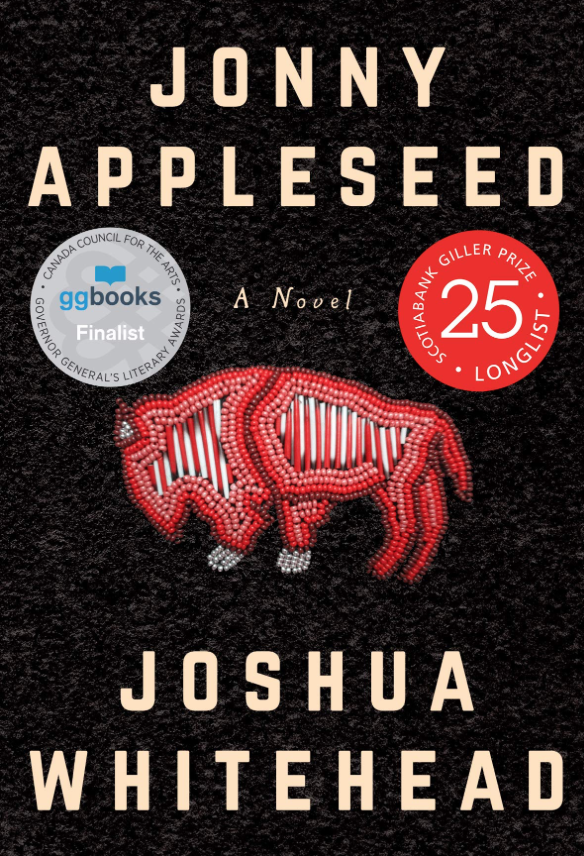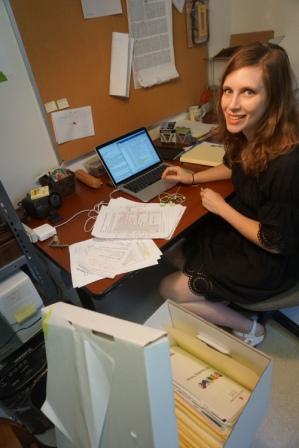
I read Jonny Appleseed as soon as I spotted it at the archives, and I fell in love with this book. The novel, by Two-Spirit/Indiqueer writer Joshua Whitehead, is the 2018 follow up to his 2017 poetry collection Full Metal Indigiqueer. I hesitated to write about it, acknowledging that the book is far outside of my cultural experience, and wanting to give it proper justice. During a discussion between Whitehead and author Alicia Elliott following the Toronto launch, Elliott expressed a similar concern about white critics missing some of the nuances and layers, and it is for this reason that I debated seeking out someone who might better write about it. In discussion with a friend, I remarked that I could only write about how I interacted and engaged with it personally, and incorporate the insights of the author and other Indigenous artists. This book should be read well outside of the community it takes place in, and I am acknowledging that I am writing from outside of that community.
During the book launch, Whitehead discussed how the character of Jonny had arisen in the background of the aforementioned poetry collection. Jonny then made an appearance in a short story of the same name before becoming a fully developed character with a story that has not been told before, but deserved to be heard. In this book, the reader follows Jonny, self-identified “NDN glitter princess,” returning to the rez for a funeral. Theme of return is important on several layers. The literal return has him dealing with how to scrape up money to get home, while he is also returning to memories of his family (whom he has left behind at the rez) and everything he has done and been between living on the rez and present day. “My home is full of hope and ghosts,” he says, and to echo this most of the short chapters are crafted out of memory fragments that are interwoven and stitched together with Jonny’s life in present day. During her discussion with Whitehead, Elliott remarked on how the writing style also follows a circle, and that circular form has deeper meaning for those with Indigenous roots: “this is how we craft,” she noted.
There is a lot to like about Jonny Appleseed. Jonny constantly treads a line between and acknowledges the duality of his identities –“Hell, I played straight on the rez in order to be NDN and here I played white in order to be queer.” The dream sequences in the novel are beautifully painted and vibrantly connect the character and consequently, the reader, to nature, which is part of the character’s identity. Tias, a secondary character within the novel, functions as a vehicle through which to more deeply explore Jonny’s emotions and connections with others. The relationship and intimacy that is explored between Jonny and Tias, his long-term friend and lover,is depicted with an incredible tenderness. Jonny, who performs sex acts via webcam to make money, acknowledges “There are tons of unfuckable holes in me that need to be filled.” The reader gets a sense that Tias is “filling some of those holes,” so to speak, and that their form of intimacy sustains both of them.
Another refreshing and relevant element to this book is how Whitehead gives honest, relatable depictions of Jonny’s life, both now and when he lived on the rez. Early on in the book:
I go and fry a couple of eggs and the heart-shaped pieces of bologna I have left, then pour myself some orange juice which only fills about a third of the glass, so I mix it with Tang and top it off with tap water—an NDN breakfast if I ever did see one. I scroll through Facebook on my phone and read lengthy monologues by people I went to high school with: so-and-so is pregnant, my cousin’s cousin’s boyfriend in on another bender, a rez fire, a little boy attacked by wild dogs, and a million posts about missing girls.
Whitehead also intersperses Oji-Cree throughout, and the injected language refreshingly isn’t othered by italicizing it or putting it in quotes—rather, the language is naturalized in its flow departing from and returning to English. These two points are noteworthy because it is evident (as was also noted by Elliott) that Whitehead has no interest in pandering to an audience outside of his own. He is writing what is comfortable and true for his characters and his community. During an interview with musician Jeremy Dutcher at the Toronto Public Library, a similar sentiment was expressed: there is no need to pander to or translate for a white audience; if they want to enjoy and understand Indigenous art on multiple levels, they must do the work. From my positionality, this is important; I can recognize that Whitehead is not writing for me, is not writing to teach me about his culture or way of life—rather, he is creating art to relate to his community.
I mention in my opening paragraph that this book ‘should’ be read. Most of the reasons I’ve already discussed: the narrative is compelling, the protagonist is richly developed, the imagery is well crafted, the language and style are refreshing. But beyond this? Jonny Appleseed is simply an enjoyable Canadian novel.
Jonny Appleseed is a great addition to the queer canon, and with it Whitehead adds his name to a blossoming list of talented two-spirit and queer Indigenous authors and poets producing powerful work right now. The Arquives currently includes works by Sharron Proulx-Turner, Tomson Highway, Jewelle Gomez, Daniel David Moses, Gregory Scofield, Chrystos, and Gwen Benaway (whose latest, Holy Wild, is well worth checking out as well), and that list is growing. If you are looking for more by Whitehead here at the archives, you can peruse Full Metal Indigiqueer in the Arquives Reading Room, and, or thumb through Issue #7 (the two-spirit issue) of Red Rising magazine.

